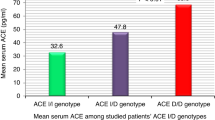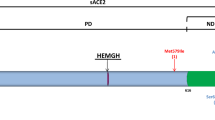Abstract
Background
The renin-angiotensin system is potentially involved in the pathogen-host interaction in the disease caused by SARS-CoV-2, since the angiotensin-converting enzyme (ACE) 2 serves as a receptor for the virus. The impact of the pandemic in specific regions and ethnic groups highlights the importance of investigating genetic factors that disrupt the balance of the system in response to SARS-CoV-2 infection, especially in genes with ethnic frequency variations. Therefore, this study aimed to evaluate the influence of the ACE I/D polymorphism on the incidence and severity of COVID-19 in a sample of the Brazilian population.
Methods and results
70 severe cases and 355 mild cases patients were evaluated. DNA extraction was performed using a QIAamp DNA Blood Mini kit. Genotyping of ACE I/D polymorphism was performed. Clinical outcomes were obtained from the patients’ records. We found an association between the ACE I/D polymorphism and the incidence or severity of COVID-19 in male participants. Moreover, we observed a relationship between severity and increasing age and body weight and a higher frequency of II genotype individuals among those who had a cough as their symptoms in mild patients. No differences were observed in leukocyte count or other parameters related to the inflammatory response in severe patients.
Conclusions
Our data showed the influence of the ACE I/D polymorphism on severity of COVID-19 in males, as well as on the occurrence of cough in patients with mild symptoms, with a higher incidence in those carrying the I allele.


Similar content being viewed by others
Data availability
Data supporting all figures and tables are not publicly available to protect patient privacy. These data can be accessed on request from Dr. Marcelo Wajchenberg, upon the completion of a Data Usage Agreement, according to policies from the Hospital Israelita Albert Einstein Ethical committees.
References
Gallo Marin B, Aghagoli G, Lavine K et al (2021) Predictors of COVID-19 severity: a literature review. Rev Med Virol 31:1–10. https://doi.org/10.1002/rmv.2146
Izcovich A, Ragusa M, Tortosa F et al (2020) Prognostic factors for severity and mortality in patients infected with COVID-19: a systematic review. SSRN Electron J. https://doi.org/10.2139/ssrn.3627285
Lorente L, Martín MM, Franco A et al (2021) HLA genetic polymorphisms and prognosis of patients with COVID-19. Med Intensiva 45:96–103. https://doi.org/10.1016/j.medin.2020.08.004
Singh HO, Choudhari R, Nema V, Khan AA (2021) ACE2 and TMPRSS2 polymorphisms in various Diseases with special reference to its impact on COVID-19 Disease. Microb Pathog 150:. https://doi.org/10.1016/j.micpath.2020.104621
Hashemi S, Thijssen M, Hosseini S et al (2021) Human gene polymorphisms and their possible impact on the clinical outcome of SARS-CoV-2 Infection. Arch Virol 166
Almeida SS, Barros CC, Moraes MR et al (2010) Plasma Kallikrein and Angiotensin I-converting enzyme N- and C-terminal domain activities are modulated by the insertion/deletion polymorphism. Neuropeptides 44:139–143. https://doi.org/10.1016/j.npep.2009.12.003
Alimoradi N, Sharqi M, Firouzabadi D et al (2022) SNPs of ACE1 (rs4343) and ACE2 (rs2285666) genes are linked to SARS-CoV-2 Infection but not with the severity of Disease. Virol J 19:. https://doi.org/10.1186/s12985-022-01782-6
Delanghe JR, Speeckaert MM, De Buyzere ML (2020) COVID-19 Infections are also affected by human ACE1 D/I polymorphism. Clin Chem Lab Med 58:1125–1126. https://doi.org/10.1515/cclm-2020-0425
Weekly Operational Update on COVID-19. In: World Heal. WHO, Organ (2022) https://www.who.int/publications/m/item/weekly-operational-update-on-covid-19---30-march-2022. Accessed 11 Dec 2023
Kuster GM, Pfister O, Burkard T et al (2020) SARS-CoV2: should inhibitors of the renin-angiotensin system be withdrawn in patients with COVID-19? Eur Heart J 41:1801–1803. https://doi.org/10.1093/eurheartj/ehaa235
Skeggs LT, Kahn JR, Shumway NP (1956) The preparation and function of the hypertensin-converting enzyme. J Exp Med 103:295–299. https://doi.org/10.1084/jem.103.3.295
Colucci JA, Yuri Arita D, Sousa Cunha T et al (2011) Renin-angiotensin system may trigger kidney damage in NOD mice. JRAAS - J Renin-Angiotensin-Aldosterone Syst 12:15–22. https://doi.org/10.1177/1470320310375456
Mehta PK, Griendling KK (2007) Angiotensin II cell signaling: physiological and pathological effects in the cardiovascular system. Am J Physiol - Cell Physiol 292. https://doi.org/10.1152/ajpcell.00287.2006
Santos RAS, Sampaio WO, Alzamora AC et al (2018) The ACE2/Angiotensin-(1–7)/Mas axis of the renin-angiotensin system: focus on Angiotensin-(1–7). Physiol Rev 98:505–553. https://doi.org/10.1152/physrev.00023.2016
Beyerstedt S, Casaro EB, Rangel ÉB (2021) COVID-19: angiotensin-converting enzyme 2 (ACE2) expression and tissue susceptibility to SARS-CoV-2 Infection. Eur J Clin Microbiol Infect Dis 40:905–919. https://doi.org/10.1007/s10096-020-04138-6
Babajani F, Kakavand A, Mohammadi H et al (2021) COVID-19 and renin angiotensin aldosterone system: Pathogenesis and therapy. Heal Sci Reports 4. https://doi.org/10.1002/hsr2.440
Patel S, Rauf A, Khan H, Abu-Izneid T (2017) Renin-angiotensin-aldosterone (RAAS): the ubiquitous system for homeostasis and pathologies. Biomed Pharmacother 94:317–325
Living Guidance for Clinical Management of COVID-19. In: World Heal. WHO, Organ (2022) https://www.who.int/publications-detail-redirect/WHO-2019-nCoV-clinical-2021-2. Accessed 11 Dec 2023
The Jamovi Project (2021) Jamovi (Version 1.1.7)
Poznyak AV, Bharadwaj D, Prasad G et al (2021) Renin-angiotensin system in pathogenesis of Atherosclerosis and treatment of CVD. Int J Mol Sci 22. https://doi.org/10.3390/ijms22136702
Naveed H, Elshafeey A, Al-Ali D et al (2021) The interplay between the Immune System, the renin-angiotensin-aldosterone system (RAAS), and RAAS inhibitors may modulate the outcome of COVID-19: a systematic review. J Clin Pharmacol 61:987–1000. https://doi.org/10.1002/jcph.1852
Tay MZ, Poh CM, Rénia L et al (2020) The trinity of COVID-19: immunity, inflammation and intervention. Nat Rev Immunol 20:363–374. https://doi.org/10.1038/s41577-020-0311-8
Ponti G, Maccaferri M, Ruini C et al (2020) Biomarkers associated with COVID-19 Disease progression. Crit Rev Clin Lab Sci 389–399. https://doi.org/10.1080/10408363.2020.1770685
Boechat J, Chora I, Morais A, Delgado LAO (2021) The immune response to SARS-CoV-2 and COVID-19 immunopathology - current perspectives. Pulmonology 27:423–437
Gunal O, Sezer O, Ustun GU et al (2021) Angiotensin-converting enzyme-1 gene insertion/deletion polymorphism may be associated with COVID-19 clinical severity: a prospective cohort study. Ann Saudi Med 41:141–146. https://doi.org/10.5144/0256-4947.2021.141
Verma S, Abbas M, Verma S et al (2021) Impact of I/D polymorphism of angiotensin-converting enzyme 1 (ACE1) gene on the severity of COVID-19 patients. Infect Genet Evol 91. https://doi.org/10.1016/j.meegid.2021.104801
Baştuğ S, Çavdarlı B, Baştuğ A et al (2022) Are angiotensin converting enzyme (ACE1/ACE2) gene variants associated with the clinical severity of COVID-19 Pneumonia? A single-center cohort study. Anatol J Cardiol 26:133–140. https://doi.org/10.5152/AnatolJCardiol.2021.502
Karakaş Çelik S, Çakmak Genç G, Pişkin N et al (2021) Polymorphisms of ACE (I/D) and ACE2 receptor gene (Rs2106809, Rs2285666) are not related to the clinical course of COVID-19: a case study. J Med Virol 93:5947–5952. https://doi.org/10.1002/jmv.27160
Torres-Castro R, Vasconcello-Castillo L, Alsina-Restoy X et al (2021) Respiratory function in patients post-infection by COVID-19: a systematic review and meta-analysis. Pulmonology 27:328–337. https://doi.org/10.1016/j.pulmoe.2020.10.013
Acknowledgements
The authors would like to thank the students of Hospital Israelita Albert Einstein for their technical assistance and support.
Funding
This study was supported by Conselho Nacional de Desenvolvimento Científico e Tecnológico (CNPq #301732/2018-3) and Fundação de Amparo à Pesquisa do Estado de São Paulo (FAPESP#2018/16565-0).
Author information
Authors and Affiliations
Contributions
Conceptualization, S.A. C.B., M.W.; methodology, S.A., M.G., C.B.; investigation, S.A., I.G., M.S., D.M.; resources, S.A., M.W.; data curation, S.A., I.G., M.S., V.S., D.M., M.W.; writing—original draft preparation, S.A., M.G., writing—review and editing, S.A., M.G., V.S., M.W.; project administration, S.A.; funding acquisition, S.A and M.W.; All authors have read and agreed to the published version of the manuscript.
Corresponding author
Ethics declarations
Competing interests
The authors declare no competing interests.
Conflict of interest
The authors declare that the research was conducted in the absence of any commercial or financial relationships that could be construed as a potential conflict of interest.
Ethics approval and consent to participate
The study was carried out in accordance with the principles of the Declaration of Helsinki and was approved by the ethical committee of the Sociedade Beneficente Israelita Brasileira Hospital Albert Einstein (CAAE: 32855020.3.0000.0071), São Paulo. Written informed consent was obtained from all subjects and/or their parents.
Additional information
Publisher’s Note
Springer Nature remains neutral with regard to jurisdictional claims in published maps and institutional affiliations.
Rights and permissions
Springer Nature or its licensor (e.g. a society or other partner) holds exclusive rights to this article under a publishing agreement with the author(s) or other rightsholder(s); author self-archiving of the accepted manuscript version of this article is solely governed by the terms of such publishing agreement and applicable law.
About this article
Cite this article
Almeida, S.S., Gregnani, M.F., da Costa, I.M.G. et al. ACE I/D polymorphism is a risk factor for the clinical severity of COVID-19 in Brazilian male patients. Mol Biol Rep 51, 180 (2024). https://doi.org/10.1007/s11033-023-09189-4
Received:
Accepted:
Published:
DOI: https://doi.org/10.1007/s11033-023-09189-4




